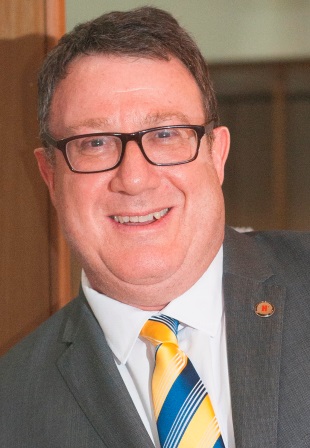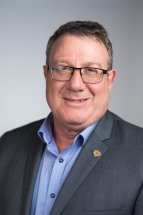GAVIN FINKELSTEIN
Gavin Finkelstein is President, Haemophilia Foundation Australia

It has been a very busy three months since the publication of the last edition of National Haemophilia. We held our Annual General Meeting and Council meeting virtually on 24 October 2020, where we discussed a number of significant issues, including some major changes taking place at the World Federation of Hemophilia (WFH) and access to new therapies in Australia.

The COVID-19 pandemic has continued to wreak havoc around the world, and we are deeply conscious of its impact in countries hit hard by the virus and particularly for countries where treatment and care for bleeding disorders was already stretched or unavailable. We are grateful to WFH for providing information and support to National Member Organisations who needed this, and for finding ways for our communities to keep in touch. I attended the 2020 Annual Meeting of the General Assembly of the World Federation of Hemophilia, which was held virtually on 16 October 2020. This meeting would usually have followed the 2020 WFH Congress but was postponed when the Congress had to be cancelled because of the pandemic.
I congratulate Cesar Garrido from the Venezuelan Association for Hemophilia, who has been elected as the WFH President, and sincerely thank Alain Weill for his years of service as President. We look forward to welcoming Cesar to Australia, and to our region, either in person or virtually, as soon as possible.
We were pleased the Federal Health Minister, the Hon Greg Hunt MP, announced in September 2020 that Hemlibra® (also known as emicizumab) would be government funded through the National Blood Authority under the national blood arrangements. Hemlibra® is a treatment that can reduce or prevent bleeding in people with severe or moderate haemophilia A with and without inhibitors. Hemlibra® is not a clotting factor and there are specific regulatory requirements for how it may be prescribed. It is only available through specialist clinicians at Haemophilia Treatment Centres and there are special pharmacy and delivery requirements. There may need to be some variations in place for access in different states/territories. Further information is available on the National Blood Authority website: https://www.blood.gov.au/national-supply-arrangements-hemlibra-emicizumab. If you have any questions about your treatment or treatment products, it is recommended that you discuss them with your doctor at your Haemophilia Treatment Centre.
This has been a very important year for haemophilia treatment in Australia: we saw broader access to extended half-life clotting factor products in July followed by announcement about Hemlibra® in September and the decision of all Australian governments to jointly fund them amongst the suite of products on the National Products List. As always, this means people with haemophilia can work together with their treating specialist doctor at their Haemophilia Treatment Centre to choose the most suitable treatment for them.
HFA does not promote specific products, but it is our role to advocate for treatment and care that will offer the best outcomes for people living with a bleeding disorder in our community. This involves consulting with our community members about their healthcare requirements, which helps us make recommendations for improvement. We are excited by these new treatment products and others in the pipeline. Many people have told us about the lifechanging health outcomes from some of these new treatments. They offer new opportunities for people with haemophilia, who can expect less or no bleeding at all and a radical improvement in their quality of life and ability to participate in the community.
Unfortunately, the government assessment and review processes required to determine whether these treatment products will be purchased for Australians with haemophilia have taken several years. We hope these processes can be streamlined to reduce delays. It will also be important for the lived experience of patients and their treating doctors to be recognised for the value they can contribute to optimal outcomes for both patients and government payers.
I was pleased HFA had the opportunity to make a submission last month to a Commonwealth government House of Representatives Committee of Inquiry into the approval processes for new drugs and novel medical technologies in Australia. Our recommendations for changes to the assessment processes were based on our recent advocacy work. We shared examples of some of the experiences of people and parents of children with haemophilia who have described how dramatically their health and quality of life have improved following treatment with these new therapies. With more new therapies for haemophilia treatment and gene therapy likely to arrive in the next few years, it is an important time to consider new ways to evaluate them for government funding so delays do not continue to occur. HFA is committed to the national framework for treatment and care of bleeding disorders and works with stakeholders to uphold it. It will be a critical aspect of our work with the National Blood Authority, all Australian governments, health care providers and industry to address the assessment processes, while ensuring that the national framework for treatment and care is maintained.
In closing, I want to acknowledge our South Australian bleeding disorders community. In the absence of a Foundation for South Australia, HFA has been facilitating peer support activities. We had hoped HFA would have had a local activity to bring community members together by now, and we look forward to doing so when COVID-19 precautions allow us to hold community events.
Haemophilia Foundation Australia acknowledges the Traditional Owners and Custodians of Country throughout Australia, the land, waters and community where we walk, live, meet and work. We pay our respects to Elders past and present and extend that respect to all Aboriginal and Torres Strait Islander peoples.
Sign up for the latest news, events and our free National Haemophilia magazine